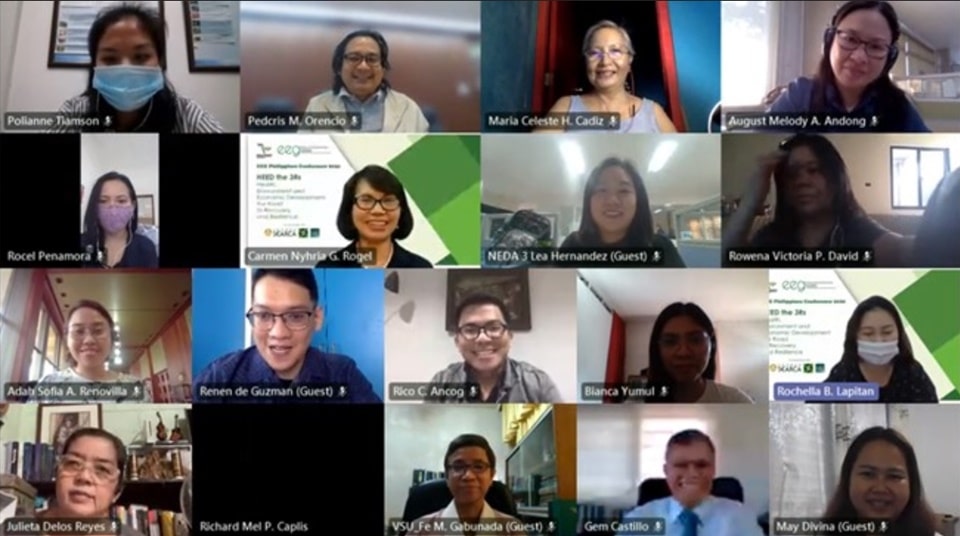
LOS BAÑOS, LAGUNA, Philippines - The Southeast Asian Regional Center for Graduate Study and Research in Agriculture (SEARCA) hosted a panel session titled “One Health/Eco-health Perspectives in Agri-Food Systems: Sustaining Livelihoods and Improving Wellbeing” during the 1st National Conference on Health, Environment, and Economic Development organized by the Economy and Environment Group Philippines (EEGP) on 19 November 2020 via MS Teams.
SEARCA’s collaboration with EEG for this conference was spearheaded by its Research and Thought Leadership Department (RTLD) under its Program Head, Dr. Pedcris M. Orencio, with support from the Center’s Management Information Services Unit (MISU) and Training for Development Unit-Education and Collective Learning Department (T4DU-ECLD).
The session focused on environmental health events in the Philippines, the African Swine Fever in particular, that have exacerbated the impacts of the ongoing pandemic. Particularly, the discussion centered on how the current situation affects the vulnerability of Filipinos, particularly smallholder farmers, fisherfolks, and agri-preneurs, whose livelihoods are put at risk and their food insecurity increased. The session also involved conversations on a paradigm shift towards improved management of agricultural and natural ecosystems, as well as youth engagement on sustainable food systems.
 Session speakers (l-r): Dr. Rico Ancog, Mr. Jim Leandro Cano, and Dr. Samuel Joseph Castro
Session speakers (l-r): Dr. Rico Ancog, Mr. Jim Leandro Cano, and Dr. Samuel Joseph Castro
Three esteemed speakers were featured in the session, namely: Dr. Samuel Joseph Castro, Officer-in-Charge Division Chief of the Animal Health and Welfare Division and Focal Person for African Swine Fever (ASF), Bureau of Animal Industry, Department of Agriculture; Dr. Rico Ancog, Operations Consultant, Emerging Innovation for Growth Department, SEARCA; and Mr. Jim Leandro Cano, Country Representative of the Young Professionals for Agricultural Development (YPARD)- Philippines.
Presenting the African Swine Fever (ASF) and its impacts on health and food systems, the economy, and the environment, Dr. Castro provided some updates on what the Philippine government does to combat and manage the disease. This involved developing an emergency management plan as well as an ASF control and prevention framework. He emphasized the importance of controlling ASF and the swine industry as pork is an important commodity in the Philippines. When these animals become pork products, ASF becomes a public health issue, putting the public at risk. Dr. Castro identified two cross-cutting issues on this matter: a social issue that is anchored on poverty because consumers tend to buy cheap pork products without documents of inspection; and an economic issue where farmers opt to sell sick pigs to recover the investment. Thus, the Department of Agriculture developed an ASF Emergency Management Plan, which includes adapting strategies on preparation, prevention, detection, response, and recovery, along with plans on emergency preparedness, contingency, operations, and recovery.
The discussions then proceeded to a practical framework for the management of healthy and resilient agricultural and natural ecosystems. Dr. Ancog emphasized the importance of focusing on the expansion of the concept of social-ecological systems to Social-Ecological System Health (SESH) being health and environmental issues must be managed holistically across multiple biophysical, economic, and social scales and landscapes, and at national and global levels. SESH involves linking health and ecosystem management with the adaptive capacity of the actors and agents of a coupled social-ecological system to prevent and cope with emerging health and environmental risks and achieve health and well-being. Given that the state/health of a functional social-ecological system results from the state/health status of its main components and from the interactions between these individual health components improving the capacity of the system to sustainably deliver health to the different constitutive components will build the resilience of a social-ecological system. This has now been typically targeted by sustainable development and resilience-building projects. Dr. Ancog ended his presentation by stressing that these paradigm shifts are necessary if we are to achieve transformations toward “healthy” development pathways which will be one of the greatest challenges for humanity in the decades to come, especially in a post-COVID-19 traumatized context.
Highlighting the opportunities for the youth, Mr. Cano emphasized the importance of creating the necessary environment for engagement and employment for sustainable food systems. He identified four aspects to consider when referring to sustainable food systems: critically considering climate change as it affects the food system; determining the food system in seeing the supply and demand for crops; using systems thinking approach to better appreciate food systems because its drivers are not operating in silos but are intertwined; and looking at mobility as a concept when it comes to migration especially for the youth today who are moving around following opportunities. These aspects help build a sustainable food systems framework that provides an opportunity for the youth to engage. With the available technologies today, there is a bigger chance to create interest among the youth and to spark their interest to engage and participate in agriculture. This is something to take advantage of.
The panel session’s theme is in line with SEARCA’s priority area of Eco-Health/One Health Applications to Agricultural and Rural Development under its 11th Five-Year Plan of Accelerating Transformation through Agricultural Innovation (ATTAIN). Eco-Health/One Health is a holistic approach to health that emphasizes how the complex relationships among ecosystem components affect human health and environmental quality.